mil gracias😊 it's truly innovative and humanizing - hope you'll read/submit and share!
27.02.2026 00:46 —
👍 1
🔁 0
💬 0
📌 0

Racial Justice in Multilingual Education: A New Open-Access Journal on Race, Language and Education. I've joined the RJME Review Board! Check it out at rjme.org! 1-Read and Share 2-Submit Your Work 3-Ask me Your Questions
Thank you for inviting me @rjme-journal - excited to get started as a review board member! #AcademicSky #Research #LanguageEducation #TeacherEducation #WorldLanguages #BlackWorldLanguaging
27.02.2026 00:35 —
👍 4
🔁 2
💬 1
📌 0

Piscataway Public LIbrary
AFrican American
Read-in
February 2026
Tasha Austin pictured alongside bilingual children's book 'El Barrio Mío/My Neighborhood"
So excited to read as a part of the African American Read-In! If you know families with littles, please encourage them to register for this amazing event!
#BlackHistoryMonth #TeacherEducation #KidLit #AcademicSky #LanguageEducation
www.piscatawaylibrary.org/read-in
16.02.2026 16:42 —
👍 4
🔁 2
💬 0
📌 0

Webinar Zoom boxes with webinar presenters, moderators and participants
Power matters in the language classroom but we can redistribute the labor of who gets to be 'home & target cultures' with perspective-making
Thank you New York State Department of Education & Erin Kearney!
#WorldLanguages #AcademicSky #TeacherEducation
www.taylorfrancis.com/chapters/edi...
27.01.2026 22:58 —
👍 3
🔁 1
💬 0
📌 0
Language learning is not a privilege, but a necessity - a joy!
My autobiographical bilingual children's book explores Spanish language learning in community; as relationship
Amplify narratives of linguistic & cultural diversity🌍
#AcademicSky #EduSky #Skybrarian
www.authorhouse.com/en/bookstore...
25.01.2026 18:56 —
👍 0
🔁 0
💬 0
📌 0
![Title of slide: Zora Neale Hurston: Claiming a Space (2023)
[Image of documentary on Zora Neale Hurston 'Claiming A Space']
Text of slide: What do you see as the challenges of being a cultural insider/outsider?
How might funding produce a conflict of interest in one’s work?
What is the role of linguistic fidelity in qualitative work?
How do time spent, dis/honesty and compensation impact ethnography?
Other?](https://cdn.bsky.app/img/feed_thumbnail/plain/did:plc:fkbto2nkox2r5aohryveq5as/bafkreicltvemaaw5ea6otttobdjkgzc6cry6hx6i3fuuyhrpzc3x5vlcua@jpeg)
Title of slide: Zora Neale Hurston: Claiming a Space (2023)
[Image of documentary on Zora Neale Hurston 'Claiming A Space']
Text of slide: What do you see as the challenges of being a cultural insider/outsider?
How might funding produce a conflict of interest in one’s work?
What is the role of linguistic fidelity in qualitative work?
How do time spent, dis/honesty and compensation impact ethnography?
Other?
as i launch my first ever k-12 study, a class from the course i teach on ed research hits different
breaking the observer/ed hierarchy/dichotomy & working as a cultural insider rather than an objectifier is a beautiful labor
thank you ancestor Zora
so humbled
so grateful♥️🖤💚
#EduSky #AcademicSky
13.01.2026 19:01 —
👍 1
🔁 0
💬 0
📌 0

Culture eminently eludes any form of simplification.
When the colonized intellectual writing for his people uses the past he must do so with the intention of opening up the future, of spurring them into action and fostering hope.
-Fanon (1961)
Sitting with the timeless wisdom of Fanon today:
#WorldLanguages #LanguageEducation #EduSky #AcademicSky #Blackademic #EdResearch
07.01.2026 17:28 —
👍 0
🔁 0
💬 0
📌 0

Dr. Betina Hsieh & Dr. Tasha Austin hug after doctoral hooding

4 images of a recently graduated Dr. Austin in various poses & fits around the campus of the school from which she graduated. Announcement reads 'Rutgers 2022' 'Dr. Tasha Austin, PhD' 'Venmo library fund @Tasha-Austin-2'
in search of wrapping paper anoche i stumbled upon my graduation announcement. the me of 2022 could not have fathomed the healing i now experience
my homie hooded me in the sala
i skipped graduation & kept my integrity
the pomp dont change your circumstance
love does.
#EduSky #AcademicSky
23.12.2025 15:01 —
👍 3
🔁 0
💬 0
📌 0

It starts with knowing the truth. Don’t allow yourselves to be gaslit into believing this is a real question.
06.12.2025 14:44 —
👍 13608
🔁 5079
💬 429
📌 190

Spencer Small grant team - T. Austin, D. James & A. Raysor smile for Zoom photo

"Thank you for submitting your proposal, “They is me!”: Redefining ‘Traditional’ Students Through
Narratives of Black World Language Teachers, for presentation at the 2026 American Association
for Applied Linguistics Conference. We are pleased to inform you that your submission has been
selected for inclusion in the conference program as an individual paper.
As a reminder, you submitted this proposal for the following conference:
Chicago: March 21-24 2026
This year we received more than 2400 proposals for consideration. Decisions were reached after
an extensive review process involving 54 strand coordinators, 647 peer reviewers, and the
conference organizing committee. Due to the limitations placed on us by scheduling and space, the
acceptance rate for submissions was quite competitive. So, warm congratulations! Look for more
information after November 6, 2025."
Indescribably proud to lead this team! @spencerfoundation.bsky.social study on Black WL teachers accepted to AAAL 2026 in Chicago!
Aminah Raysor & @queendomteaching.bsky.social are brilliant emerging scholars. Let's hear it for them!👏🏿👏🏿👏🏿
#TeacherEducation #LanguageEducation #BlackWorldLanguaging
01.10.2025 19:35 —
👍 6
🔁 1
💬 1
📌 0

The difference between good and bad languaging is the evaluator’s knowledge of said practice’s history and context
Reminder from your friendly neighborhood educational linguist:
#CheckYourself #YourSlipIsShowing #BlackWorldLanguaging
#AcademicChatter
30.08.2025 17:12 —
👍 7
🔁 3
💬 0
📌 1
Thanks to the brilliant editors and to Erin Kearney for collaborating on this with me.
DM for a copy!
#AcademicChatter #WorldLanguages #Interculturality #TeacherPreparation #BeyondCurriculum #PedagogicalInnovation #InstructionalDesign
21.08.2025 19:12 —
👍 3
🔁 1
💬 0
📌 0
increasing the likelihood of sustained interest and robust cultural representation in WL instruction.
We know that Black and marginalized learners in US WLs are framed as neither home nor target cultures. WLTs have the power to change that through design and pedagogy choices!
21.08.2025 19:12 —
👍 3
🔁 1
💬 1
📌 0
Having just returned from 🇪🇸 after 18yrs away, I am ever more affirmed in our need for perspective-making in WLs.
WL educators can lighten the burden of acknowledging, centering and validating the experiences of those multiply marginalized /2
21.08.2025 19:12 —
👍 2
🔁 0
💬 1
📌 0

Holding the handbook of research in world language instruction smiling

Chapter 17: Perspective Making and Its Potential in Intercultural Learning - book open to the first page of the co-authored chapter by Erin Kearney and Tasha Austin
Our chapter on perspective-making is out! I just received my copy of the handbook of research in world language instruction and couldn’t be more excited! /1
21.08.2025 19:04 —
👍 9
🔁 2
💬 1
📌 0
I’m glad she had me show up on paper the way I do verbally. In my full stature - talkin my shit. Go read #TheMessage by Ta-nihisi Coates, Free Pal*stine and Free the good brother Chris Smalls.
/fin
31.07.2025 01:28 —
👍 3
🔁 0
💬 1
📌 0
Today, this brave brother from Jersey is being held captive for standing on business and trying to feed Pal*stinians who are being g*nocided with our tax dollars. 👁️DF, KKK, or whatever determined he should be the sole activist to be brutalized in this way. Go figure.
/6
31.07.2025 01:26 —
👍 2
🔁 0
💬 1
📌 0
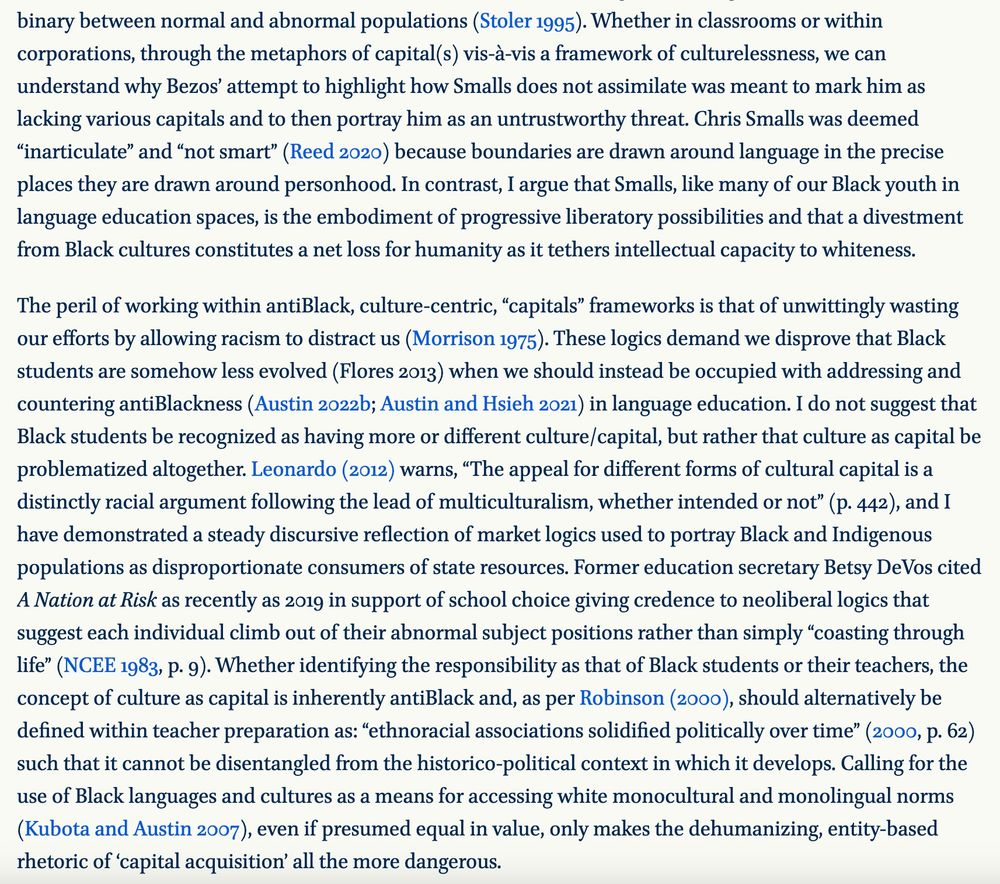
Whether in classrooms or within corporations, through the metaphors of capital(s) vis-à-vis a framework of culturelessness, we can understand why Bezos’ attempt to highlight how Smalls does not assimilate was meant to mark him as lacking various capitals and to then portray him as an untrustworthy threat. Chris Smalls was deemed “inarticulate” and “not smart” (Reed 2020) because boundaries are drawn around language in the precise places they are drawn around personhood. In contrast, I argue that Smalls, like many of our Black youth in language education spaces, is the embodiment of progressive liberatory possibilities and that a divestment from Black cultures constitutes a net loss for humanity as it tethers intellectual capacity to whiteness.
The peril of working within antiBlack, culture-centric, “capitals” frameworks is that of unwittingly wasting our efforts by allowing racism to distract us (Morrison 1975). These logics demand we disprove that Black students are somehow less evolved (Flores 2013) when we should instead be occupied with addressing and countering antiBlackness (Austin 2022b; Austin and Hsieh 2021) in language education. I do not suggest that Black students be recognized as having more or different culture/capital, but rather that culture as capital be problematized altogether. Leonardo (2012) warns, “The appeal for different forms of cultural capital is a distinctly racial argument following the lead of multiculturalism, whether intended or not” (p. 442), and I have demonstrated a steady discursive reflection of market logics used to portray Black and Indigenous populations as disproportionate consumers of state resources. Former education secretary Betsy DeVos cited A Nation at Risk as recently as 2019 in support of school choice giving credence to neoliberal logics that suggest each individual climb out of their abnormal subject positions rather than simply “coasting through life” (NCEE 1983, p. 9). Whether identifying the responsibility as th…
I later connected his advocacy to the failure of *linguistic capital* metaphor arguing that not only was Smalls’ languaging *not* unintelligent, said accusations were a smokescreen for just how dangerous Black leadership that is unapologetically Black culturally is to a dehumanizing system
/5
31.07.2025 01:23 —
👍 2
🔁 0
💬 1
📌 0
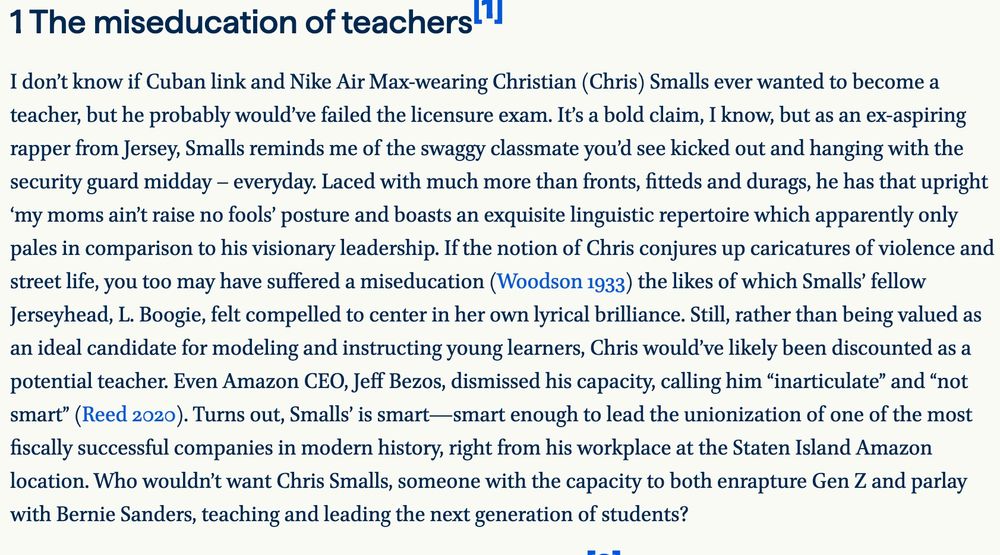
I don’t know if Cuban link and Nike Air Max-wearing Christian (Chris) Smalls ever wanted to become a teacher, but he probably would’ve failed the licensure exam. It’s a bold claim, I know, but as an ex-aspiring rapper from Jersey, Smalls reminds me of the swaggy classmate you’d see kicked out and hanging with the security guard midday – everyday. Laced with much more than fronts, fitteds and durags, he has that upright ‘my moms ain’t raise no fools’ posture and boasts an exquisite linguistic repertoire which apparently only pales in comparison to his visionary leadership. If the notion of Chris conjures up caricatures of violence and street life, you too may have suffered a miseducation (Woodson 1933) the likes of which Smalls’ fellow Jerseyhead, L. Boogie, felt compelled to center in her own lyrical brilliance. Still, rather than being valued as an ideal candidate for modeling and instructing young learners, Chris would’ve likely been discounted as a potential teacher. Even Amazon CEO, Jeff Bezos, dismissed his capacity, calling him “inarticulate” and “not smart” (Reed 2020). Turns out, Smalls’ is smart—smart enough to lead the unionization of one of the most fiscally successful companies in modern history, right from his workplace at the Staten Island Amazon location. Who wouldn’t want Chris Smalls, someone with the capacity to both enrapture Gen Z and parlay with Bernie Sanders, teaching and leading the next generation of students?
My description to her featured Chris Smalls and the way Bezos maligned him for his use of Black languaging characterizing him as “not smart” when in reality, his brilliance allowed for him to unionize the behemoth that is Amazon
/4
31.07.2025 01:20 —
👍 2
🔁 1
💬 1
📌 0
![The edTPA (Educative Teacher Preparation Assessment) obscures this racialized sense of ownership by unmarking (Mena and García 2021) academic language as a racialized register. The maintenance of white supremacy through commodifying terms like “social,” “linguistic,” and “cultural capital” (Melamed 2006), solidifies racial hierarchies by offering to the ‘unintelligible’ Black student whose access is necessarily limited to capitals of a lesser value, two options: either attempt intelligibility for the white perceiving subject (Rosa and Flores 2017), or accept pathologization (Nair et al. 2023; Privette 2021). The fundamental understanding of the capital metaphor reproduces the image of the culturally-bereft subhuman (Wynter 2003) Black student who must be given white language (Fanon 1967) and culture (Kynard 2013) or ways of being to interrupt their burdening of a benevolent nation.
This pursuit of social uplift, which is cast as either the responsibility of the learners or teachers (Kynard 2013) depending upon the (con)text, counterintuitively positions Black students as valueless and perpetual consumers of more quantity and quality capital—a euphemism for humanness or whiteness (Wynter 2003). The representation of Black students in particular as receptacles for white mainstream language and culture does not reveal that the ability to occupy white subject positions or to derive social benefits from said positions directly violates the logics of the capital metaphor. Fanon cautions that “[t]he colonized is elevated above his jungle status in proportion to his adoption of the mother country’s cultural standards” (1967, p. 18), thereby rendering Black students in U.S. schools as cultureless and their cultural ways of being as commodifiable entities disembodied from the people who perform them (Smalls 2020). This continued denial of Black humanity (Shange 2020) is evidenced by the unmarking (Mena and García 2021) of white mainstream English (Smitherman 1998) through ra…](https://cdn.bsky.app/img/feed_thumbnail/plain/did:plc:fkbto2nkox2r5aohryveq5as/bafkreih6l2hhnml6rxm5h7w4nukzajs7gregfoupwonsztoiqkjl2zo3ia@jpeg)
The edTPA (Educative Teacher Preparation Assessment) obscures this racialized sense of ownership by unmarking (Mena and García 2021) academic language as a racialized register. The maintenance of white supremacy through commodifying terms like “social,” “linguistic,” and “cultural capital” (Melamed 2006), solidifies racial hierarchies by offering to the ‘unintelligible’ Black student whose access is necessarily limited to capitals of a lesser value, two options: either attempt intelligibility for the white perceiving subject (Rosa and Flores 2017), or accept pathologization (Nair et al. 2023; Privette 2021). The fundamental understanding of the capital metaphor reproduces the image of the culturally-bereft subhuman (Wynter 2003) Black student who must be given white language (Fanon 1967) and culture (Kynard 2013) or ways of being to interrupt their burdening of a benevolent nation.
This pursuit of social uplift, which is cast as either the responsibility of the learners or teachers (Kynard 2013) depending upon the (con)text, counterintuitively positions Black students as valueless and perpetual consumers of more quantity and quality capital—a euphemism for humanness or whiteness (Wynter 2003). The representation of Black students in particular as receptacles for white mainstream language and culture does not reveal that the ability to occupy white subject positions or to derive social benefits from said positions directly violates the logics of the capital metaphor. Fanon cautions that “[t]he colonized is elevated above his jungle status in proportion to his adoption of the mother country’s cultural standards” (1967, p. 18), thereby rendering Black students in U.S. schools as cultureless and their cultural ways of being as commodifiable entities disembodied from the people who perform them (Smalls 2020). This continued denial of Black humanity (Shange 2020) is evidenced by the unmarking (Mena and García 2021) of white mainstream English (Smitherman 1998) through ra…
It drew on popular academic and policy texts that undergird assessments which punish Black and racially minoritized groups who don’t traffic in yt mainstream English by gatekeeping them out of the teaching profession and especially language education
/3
31.07.2025 01:18 —
👍 2
🔁 0
💬 1
📌 0
The paper was about how the *capitals* metaphor will always perpetuate antiBlackness in that Black bodies in the U.S. formation never ceased being ‘property’ and thus, property cannot *own* property
/2
31.07.2025 01:17 —
👍 2
🔁 0
💬 1
📌 0
When my 2023 paper was undergoing revisions, my mentor asked me why my verbal description of it to her was different from what I’d written
/1
31.07.2025 01:16 —
👍 2
🔁 0
💬 1
📌 0
one of my favorite eps! feels like so long ago - evergreen relevancy! thanks for posting @wardasworld.bsky.social 💜🙏🏿📿
25.07.2025 01:06 —
👍 1
🔁 0
💬 0
📌 0
45-year-old Venus Williams becomes the oldest woman since Martina Navratilova to win a singles match apnews.com/article/venu...
23.07.2025 02:11 —
👍 9913
🔁 1297
💬 159
📌 131
🙏🏿📿📿📿
23.07.2025 12:31 —
👍 0
🔁 0
💬 0
📌 0
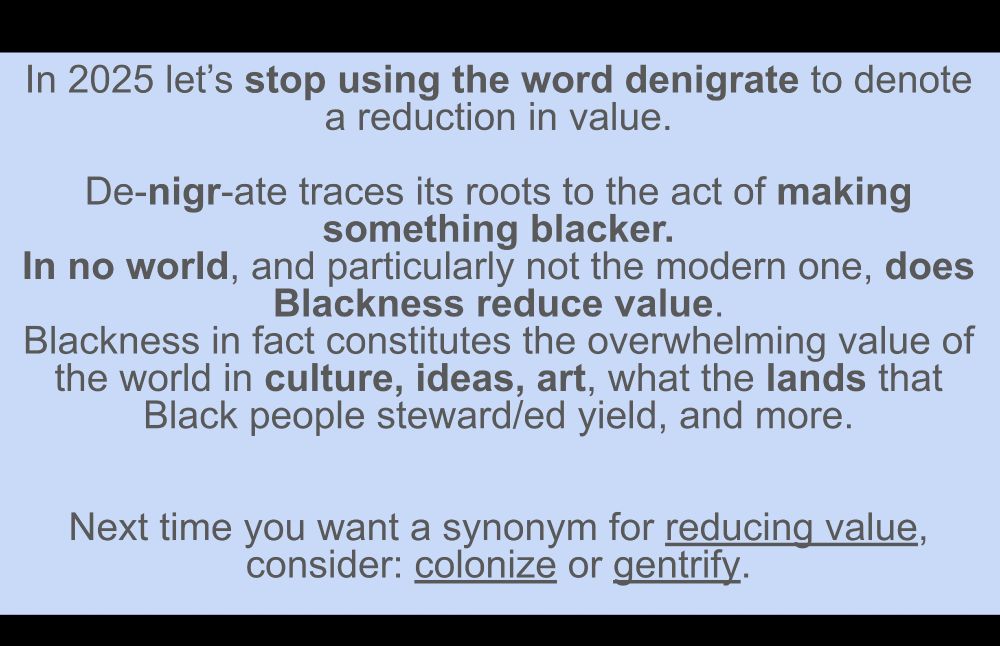
In 2025 let’s stop using the word denigrate to denote a reduction in value.
De-nigr-ate traces its roots to the act of making something blacker.
In no world, and particularly not the modern one, does Blackness reduce value.
Blackness in fact constitutes the overwhelming value of the world in culture, ideas, art, what the lands that Black people steward/ed yield, and more.
Next time you want a synonym for reducing value, consider: colonize or gentrify.
a public service announcement from your friendly neighborhood educational linguist. don't facilitate antiBlackness through thoughtless discourses! #LanguageMatters #Etymology #TheBlackerTheBetter #EncodingHierarchy #AcademicChatter
16.07.2025 00:53 —
👍 37
🔁 17
💬 2
📌 1
![“The Negro in a tight place is a genius”: Black language teachers and the (re)making of [B]lack jobs
Tasha Austin
https://orcid.org/0000-0003-0677-5061
Abstract
This chapter discusses the need for Black language scholars particularly in the role of educational linguists. It details the author’s introduction to the field and describes the vantage point of those multiply marginalized as uniquely valuable to educational linguistics. The author then introduces the raciolinguistic genealogical methodology (Flores, 2021) followed by its application in a brief study on the naturalized discourse of the Black language/teacher shortage. In taking a genealogical perspective on the discourse of Black teacher shortages, the study outlines the material distribution of both land and monies through the first and second Morrill Acts becoming the model for stratified U.S. (higher) education. Finally, the chapter concludes with an invitation for more Black/Indigenous language scholars to engage in educational linguistics to unsettle recurring discourses around “Black jobs,” who is deserving of liberal arts, (and thus, language-rich) educational opportunities, and other pressing issues in education research.](https://cdn.bsky.app/img/feed_thumbnail/plain/did:plc:fkbto2nkox2r5aohryveq5as/bafkreiaerk3af7vuty3o4aqg2jwtyjijr3gdv4xbdv33udqfk63wmewr3i@jpeg)
“The Negro in a tight place is a genius”: Black language teachers and the (re)making of [B]lack jobs
Tasha Austin
https://orcid.org/0000-0003-0677-5061
Abstract
This chapter discusses the need for Black language scholars particularly in the role of educational linguists. It details the author’s introduction to the field and describes the vantage point of those multiply marginalized as uniquely valuable to educational linguistics. The author then introduces the raciolinguistic genealogical methodology (Flores, 2021) followed by its application in a brief study on the naturalized discourse of the Black language/teacher shortage. In taking a genealogical perspective on the discourse of Black teacher shortages, the study outlines the material distribution of both land and monies through the first and second Morrill Acts becoming the model for stratified U.S. (higher) education. Finally, the chapter concludes with an invitation for more Black/Indigenous language scholars to engage in educational linguistics to unsettle recurring discourses around “Black jobs,” who is deserving of liberal arts, (and thus, language-rich) educational opportunities, and other pressing issues in education research.
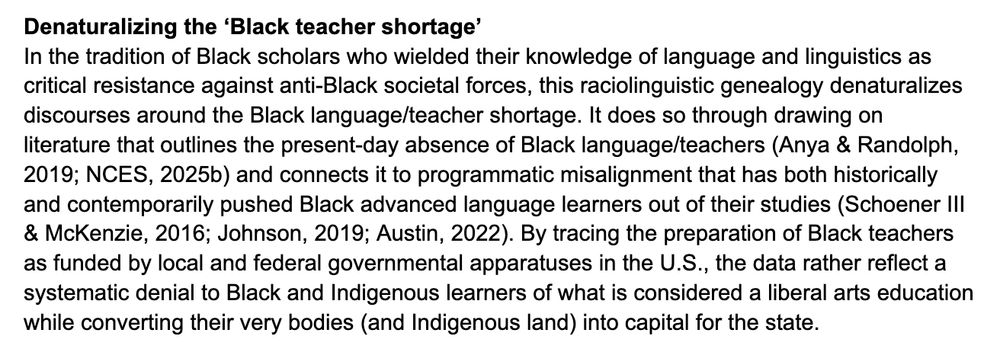
Denaturalizing the ‘Black teacher shortage’
In the tradition of Black scholars who wielded their knowledge of language and linguistics as critical resistance against anti-Black societal forces, this raciolinguistic genealogy denaturalizes discourses around the Black language/teacher shortage. It does so through drawing on literature that outlines the present-day absence of Black language/teachers (Anya & Randolph, 2019; NCES, 2025b) and connects it to programmatic misalignment that has both historically and contemporarily pushed Black advanced language learners out of their studies (Schoener III & McKenzie, 2016; Johnson, 2019; Austin, 2022). By tracing the preparation of Black teachers as funded by local and federal governmental apparatuses in the U.S., the data rather reflect a systematic denial to Black and Indigenous learners of what is considered a liberal arts education while converting their very bodies (and Indigenous land) into capital for the state.
![This chapter presents a raciolinguistic genealogy of Black language/teacher education demonstrating my assertion that educational linguistics is apt for those whose experiences most acutely reflect the shortcomings of society– particularly through the apparatus of schooling as an institution. Folks at the intersections of Black, queer, poor, women and disabled groups (among others) should be overrepresented among educational linguists not only because of their being framed as “problems” within dominant society (Du Bois, 2015), but because of our position on the margins which imbues us with perspectives often invisible to the majoritized group/s (Crenshaw, 1994; Collins, 2006). Of note, teacher education replicates some of the same challenges as linguistics– it is disproportionately valuable to peripheralized groups for the potential leverage it offers in shaping the ideologies of future generations, yet remains statistically least accessible to them (Austin & Anya, 2024; Austin, 2023; Charity-Hudley, 2023; Allen et al., 2017; Milner, 2010; Sleeter, 2001). To better understand the under-realized value of Black teachers (of language, specifically) and the apparatuses that stifle their entry to the ranks, I will take a raciolinguistic genealogical approach to denaturalizing how who is suited for leisure has been racialized as white while those suited for labor has been racialized as Black in U.S. higher education. I will first highlight the intersections between the two disciplines, teacher education and linguistics, then unpack my application of the critical educational linguistics methodology that befits the analysis –raciolinguistic genealogy (Flores, 2021), and finally present the findings of my analysis of language teacher education and its relationship to “[b]lack jobs” in the modern U.S. formation.](https://cdn.bsky.app/img/feed_thumbnail/plain/did:plc:fkbto2nkox2r5aohryveq5as/bafkreih73ilnhzu635hmnvalqe4uiugl7xann5fdri4bx2ckqfmazla4jy@jpeg)
This chapter presents a raciolinguistic genealogy of Black language/teacher education demonstrating my assertion that educational linguistics is apt for those whose experiences most acutely reflect the shortcomings of society– particularly through the apparatus of schooling as an institution. Folks at the intersections of Black, queer, poor, women and disabled groups (among others) should be overrepresented among educational linguists not only because of their being framed as “problems” within dominant society (Du Bois, 2015), but because of our position on the margins which imbues us with perspectives often invisible to the majoritized group/s (Crenshaw, 1994; Collins, 2006). Of note, teacher education replicates some of the same challenges as linguistics– it is disproportionately valuable to peripheralized groups for the potential leverage it offers in shaping the ideologies of future generations, yet remains statistically least accessible to them (Austin & Anya, 2024; Austin, 2023; Charity-Hudley, 2023; Allen et al., 2017; Milner, 2010; Sleeter, 2001). To better understand the under-realized value of Black teachers (of language, specifically) and the apparatuses that stifle their entry to the ranks, I will take a raciolinguistic genealogical approach to denaturalizing how who is suited for leisure has been racialized as white while those suited for labor has been racialized as Black in U.S. higher education. I will first highlight the intersections between the two disciplines, teacher education and linguistics, then unpack my application of the critical educational linguistics methodology that befits the analysis –raciolinguistic genealogy (Flores, 2021), and finally present the findings of my analysis of language teacher education and its relationship to “[b]lack jobs” in the modern U.S. formation.
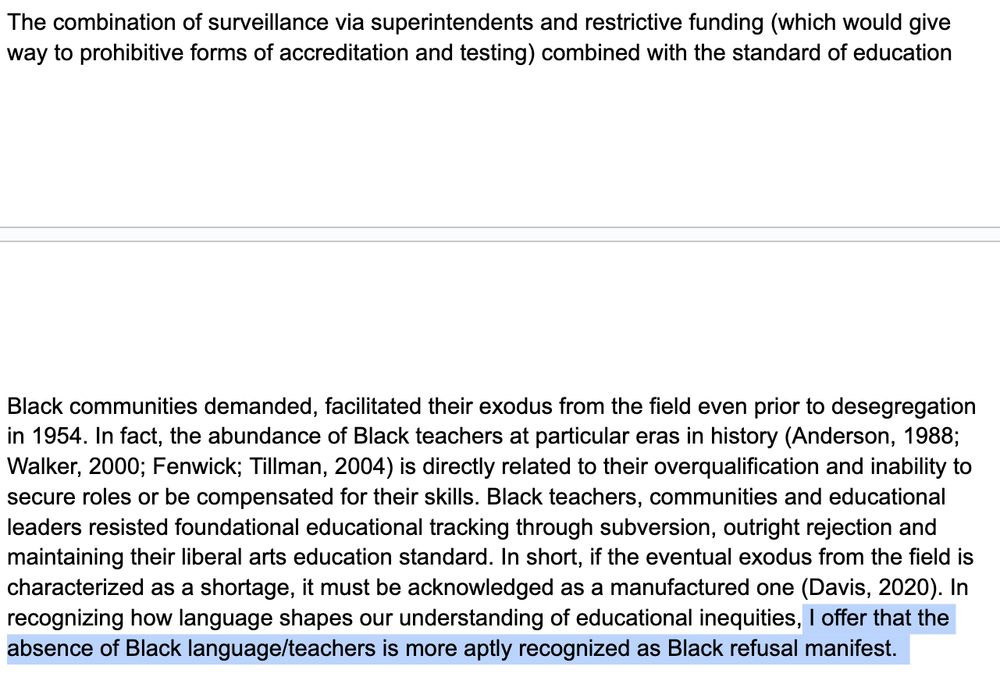
The Black language/teacher shortage when narrated within the larger discourse of US higher education, does not reflect shortage, but rather, refusal.
So proud of this handbook chapter & sharing as I think the value of it cannot afford to be delayed. Reach out for more info!
#TeacherEd #LanguageEd
02.07.2025 00:19 —
👍 4
🔁 1
💬 0
📌 0
when a school has challenges w bullying they may look n2
staff
policies
students
communities
rarely do they interrogate materials
if the 'scramble for Africa,' 'manifest destiny' & 'we're all immigrants' predominate in lessons, the kids are demonstrating proficiency
bullying is your curriculum.
30.05.2025 01:57 —
👍 2
🔁 1
💬 1
📌 0



![Title of slide: Zora Neale Hurston: Claiming a Space (2023)
[Image of documentary on Zora Neale Hurston 'Claiming A Space']
Text of slide: What do you see as the challenges of being a cultural insider/outsider?
How might funding produce a conflict of interest in one’s work?
What is the role of linguistic fidelity in qualitative work?
How do time spent, dis/honesty and compensation impact ethnography?
Other?](https://cdn.bsky.app/img/feed_thumbnail/plain/did:plc:fkbto2nkox2r5aohryveq5as/bafkreicltvemaaw5ea6otttobdjkgzc6cry6hx6i3fuuyhrpzc3x5vlcua@jpeg)









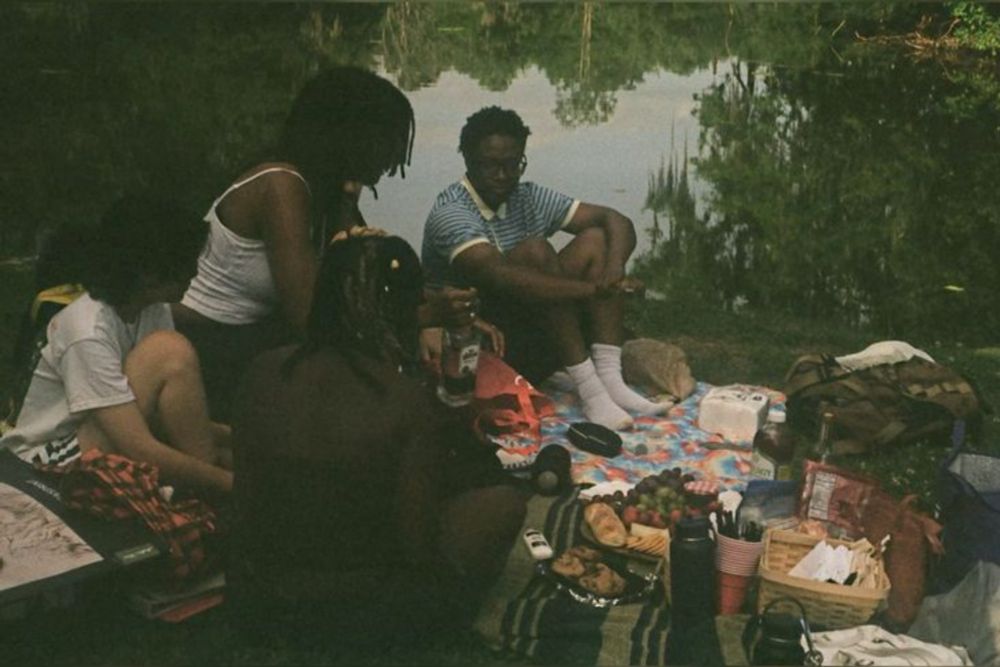
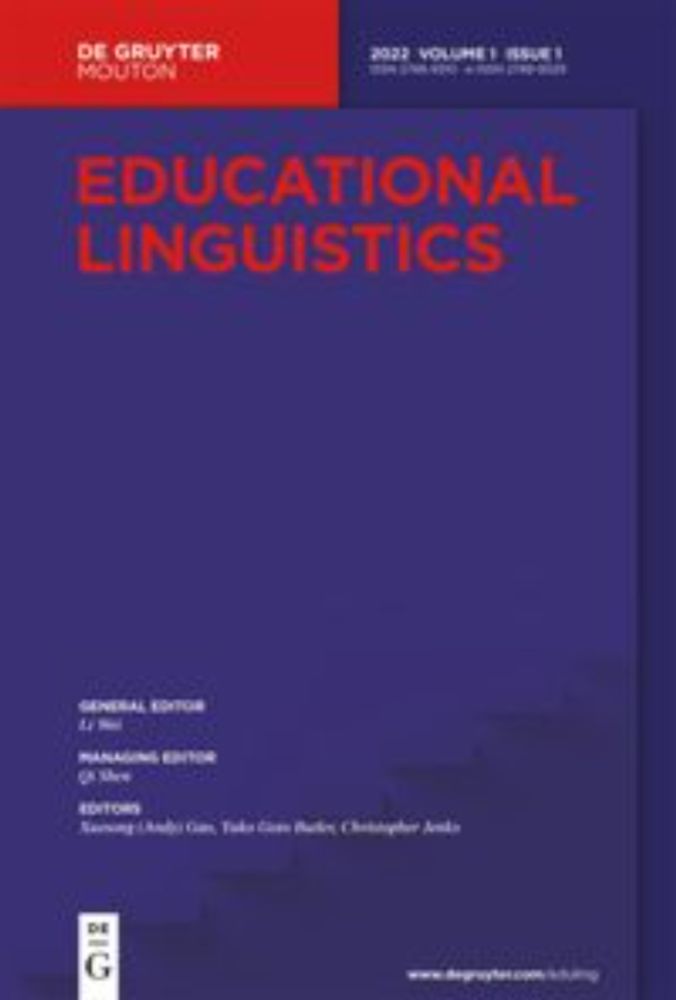


![The edTPA (Educative Teacher Preparation Assessment) obscures this racialized sense of ownership by unmarking (Mena and García 2021) academic language as a racialized register. The maintenance of white supremacy through commodifying terms like “social,” “linguistic,” and “cultural capital” (Melamed 2006), solidifies racial hierarchies by offering to the ‘unintelligible’ Black student whose access is necessarily limited to capitals of a lesser value, two options: either attempt intelligibility for the white perceiving subject (Rosa and Flores 2017), or accept pathologization (Nair et al. 2023; Privette 2021). The fundamental understanding of the capital metaphor reproduces the image of the culturally-bereft subhuman (Wynter 2003) Black student who must be given white language (Fanon 1967) and culture (Kynard 2013) or ways of being to interrupt their burdening of a benevolent nation.
This pursuit of social uplift, which is cast as either the responsibility of the learners or teachers (Kynard 2013) depending upon the (con)text, counterintuitively positions Black students as valueless and perpetual consumers of more quantity and quality capital—a euphemism for humanness or whiteness (Wynter 2003). The representation of Black students in particular as receptacles for white mainstream language and culture does not reveal that the ability to occupy white subject positions or to derive social benefits from said positions directly violates the logics of the capital metaphor. Fanon cautions that “[t]he colonized is elevated above his jungle status in proportion to his adoption of the mother country’s cultural standards” (1967, p. 18), thereby rendering Black students in U.S. schools as cultureless and their cultural ways of being as commodifiable entities disembodied from the people who perform them (Smalls 2020). This continued denial of Black humanity (Shange 2020) is evidenced by the unmarking (Mena and García 2021) of white mainstream English (Smitherman 1998) through ra…](https://cdn.bsky.app/img/feed_thumbnail/plain/did:plc:fkbto2nkox2r5aohryveq5as/bafkreih6l2hhnml6rxm5h7w4nukzajs7gregfoupwonsztoiqkjl2zo3ia@jpeg)


![“The Negro in a tight place is a genius”: Black language teachers and the (re)making of [B]lack jobs
Tasha Austin
https://orcid.org/0000-0003-0677-5061
Abstract
This chapter discusses the need for Black language scholars particularly in the role of educational linguists. It details the author’s introduction to the field and describes the vantage point of those multiply marginalized as uniquely valuable to educational linguistics. The author then introduces the raciolinguistic genealogical methodology (Flores, 2021) followed by its application in a brief study on the naturalized discourse of the Black language/teacher shortage. In taking a genealogical perspective on the discourse of Black teacher shortages, the study outlines the material distribution of both land and monies through the first and second Morrill Acts becoming the model for stratified U.S. (higher) education. Finally, the chapter concludes with an invitation for more Black/Indigenous language scholars to engage in educational linguistics to unsettle recurring discourses around “Black jobs,” who is deserving of liberal arts, (and thus, language-rich) educational opportunities, and other pressing issues in education research.](https://cdn.bsky.app/img/feed_thumbnail/plain/did:plc:fkbto2nkox2r5aohryveq5as/bafkreiaerk3af7vuty3o4aqg2jwtyjijr3gdv4xbdv33udqfk63wmewr3i@jpeg)

![This chapter presents a raciolinguistic genealogy of Black language/teacher education demonstrating my assertion that educational linguistics is apt for those whose experiences most acutely reflect the shortcomings of society– particularly through the apparatus of schooling as an institution. Folks at the intersections of Black, queer, poor, women and disabled groups (among others) should be overrepresented among educational linguists not only because of their being framed as “problems” within dominant society (Du Bois, 2015), but because of our position on the margins which imbues us with perspectives often invisible to the majoritized group/s (Crenshaw, 1994; Collins, 2006). Of note, teacher education replicates some of the same challenges as linguistics– it is disproportionately valuable to peripheralized groups for the potential leverage it offers in shaping the ideologies of future generations, yet remains statistically least accessible to them (Austin & Anya, 2024; Austin, 2023; Charity-Hudley, 2023; Allen et al., 2017; Milner, 2010; Sleeter, 2001). To better understand the under-realized value of Black teachers (of language, specifically) and the apparatuses that stifle their entry to the ranks, I will take a raciolinguistic genealogical approach to denaturalizing how who is suited for leisure has been racialized as white while those suited for labor has been racialized as Black in U.S. higher education. I will first highlight the intersections between the two disciplines, teacher education and linguistics, then unpack my application of the critical educational linguistics methodology that befits the analysis –raciolinguistic genealogy (Flores, 2021), and finally present the findings of my analysis of language teacher education and its relationship to “[b]lack jobs” in the modern U.S. formation.](https://cdn.bsky.app/img/feed_thumbnail/plain/did:plc:fkbto2nkox2r5aohryveq5as/bafkreih73ilnhzu635hmnvalqe4uiugl7xann5fdri4bx2ckqfmazla4jy@jpeg)
